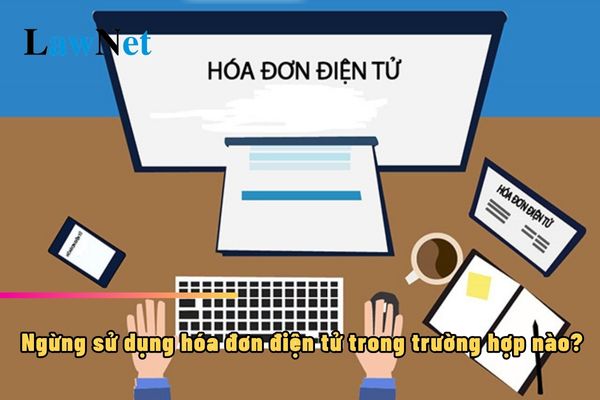What are cases of suspension of use of e-invoices in Vietnam? What are procedures for suspension of use of e-invoices in Vietnam?
What are cases of suspension of use of e-invoices in Vietnam?
Pursuant to Clause 1, Article 16 of Decree 123/2020/ND-CP, the suspension of e-invoice usage is stipulated as follows:
- Enterprises, economic organizations, other organizations, households, and individual businesses in the following cases shall suspend the use of e-invoices with tax authority codes and e-invoices without such codes:
+ Enterprises, economic organizations, other organizations, households, and individual businesses that terminate their tax identification numbers;
+ Enterprises, economic organizations, other organizations, households, and individual businesses that the tax authorities have verified and notified as non-operational at the registered address;
+ Enterprises, economic organizations, other organizations, households, and individual businesses notify competent state management agencies about temporarily suspending business activities;
+ Enterprises, economic organizations, other organizations, households, and individual businesses receive a notice from the tax authority regarding the suspension of e-invoice usage for tax debt enforcement;
+ Cases where e-invoices are used to sell smuggled goods, banned goods, counterfeit goods, or goods infringing on intellectual property rights detected and notified to the tax authority by the competent authority;
+ Cases where e-invoices are issued for the purpose of fraudulent sale of goods and services to misappropriate the money from organizations or individuals, detected and notified to the tax authority by the competent authority;
+ Cases where the business registration authority or competent state authority requests enterprises to temporarily cease conditional business operations, as they do not meet the legal requirements.
Based on inspection results, if the tax authorities determine that enterprises are established for illegal e-invoice transactions or use such invoices unlawfully to evade taxes, the tax authorities will issue a decision to suspend e-invoice usage; the enterprise will be dealt with according to legal regulations.

What are cases of suspension of use of e-invoices in Vietnam? What are procedures for suspension of use of e-invoices in Vietnam? (Image from the Internet)
What are procedures for suspension of use of e-invoices in Vietnam?
According to Clause 2, Article 16 of Decree 123/2020/ND-CP, the steps to suspend e-invoice usage are as follows:
- The directly managing tax authority sends a notice to the taxpayers as specified in Points d, e, g of Clause 1 of this Article, requesting the taxpayers to provide explanations or supplementary information and documents related to e-invoice usage.
- Taxpayers must provide explanations or supplementary information and documents within 02 working days from the date the tax authorities issue the notice. Taxpayers can directly visit the tax authorities to explain or submit information and documents or do so in writing.
- Taxpayers continue to use e-invoices or provide explanations and supplementary information, specifically:
+ If the taxpayers have sufficiently explained or supplemented information and documents and can prove that e-invoices are used in compliance with the law, they can continue using e-invoices.
+ If the taxpayers provided explanations or supplementary information and documents but could not prove lawful use of e-invoices, the tax authorities continue to request supplementary information and documents with a deadline of 02 working days from the date of the tax authorities' notice.
- If the taxpayers do not provide explanations or supplementary information within the deadline specified in the notice, the tax authorities will notify and request the taxpayers to suspend the use of e-invoices with tax authority codes or those without such codes and proceed with actions as per regulations.
- Enterprises, economic organizations, other organizations, households, and individual businesses mentioned in Clause 1, Article 16 of Decree 123/2020/ND-CP can continue using e-invoices after notifying the tax authority about resuming business or when the tax authority restores the tax identification number after the tax authority issues a decision to terminate enforcement in implementing an administrative decision on tax management by discontinuing the use of invoices or upon receiving a notice from the competent authority.
- If enterprises, economic organizations, other organizations, households, and individual businesses are temporarily suspended but need e-invoices for pre-existing contracts, they can use e-invoices on a per-transaction basis as guided in Clause 2, Article 13 of Decree 123/2020/ND-CP.
What is the database on e-invoices in Vietnam?
Pursuant to Article 93 of the Tax Administration Law 2019, the regulations are as follows:
- Tax authorities are responsible for organizing the development, management, and advancement of the database and technical infrastructure of the invoice information system; task execution of data collection, processing, and management of invoice data to ensure continuous operation, security, and safety of the invoice information system; establishing standard formats for invoices.
The e-invoice database is used to facilitate tax management and provide e-invoice information to relevant organizations and individuals.
- Enterprises and economic organizations as stipulated in Clause 2, Article 91 of the Tax Administration Law 2019 using e-invoices without tax authority codes shall report e-invoice data as prescribed by the Minister of Finance.
- The Ministry of Industry and Trade, Ministry of Natural Resources and Environment, Ministry of Public Security, Ministry of Transport, Ministry of Health, and other related agencies are responsible for sharing necessary information and data in their management fields with the Ministry of Finance to build the e-invoice database.
- During the inspection of goods circulating in the market, for instances using e-invoices, state agencies or authorized personnel shall access the e-portal of the tax authority to access e-invoice information for management needs, without requiring paper invoices. Relevant agencies are responsible for using devices to access and retrieve e-invoice data.
- The Minister of Finance shall regulate the patterns, management, and use of e-stamps; procedures for accessing, providing, and using e-invoice information; regulations for providing e-invoice information when data cannot be accessed due to technical issues, disasters affecting Internet access.

